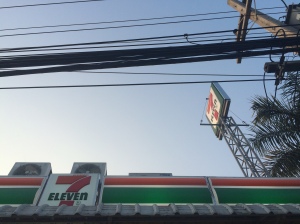People love security: the weather, that same dish in their favorite restaurant over and over again, the illusional promises of politicians and starvation in Africa.
It provokes a feeling of safety, something to hold on to, knowing what tomorrow will bring and not having to die. Yet. That feeling is applicable anywhere in the world, from Flanders Fields to the tiniest soi* in a moo baan** in Thailand.
When I was still living in Belgium, the ‘frietkot’*** was the Belgian symbol of security. The smallest village in the countryside had its own frietkot. Although these places mainly sell fries until the early morning, there are small differences in the rest of what they offer: In Brussels you can buy ‘mitrailettes’ (a bread roll filled with fries, salad and meat), frietkots in Ghent serve horse meat sausages and in the south of the country you can buy ‘carbonade’ (a type of hotpot with … fries of course).
(I have many good memories about ‘Frituur André’, a notorious frietkot near the train station of Ternat, a small town not too far from Brussels. In those days, a frietkot was still a mobile trailer. You could simply hook it on your car, tow it to the next best market place or square near a church tower and start frying and selling.)
That same universal urge for security led to the opening of a convenience store in Dallas, Texas, in 1927. It was the first store of what would later be the world-famous 7 Eleven chain of convenience stores. No fries for the gringo’s, but sausage rolls, canned baked beans and Budweiser. Knowing that one could consume the same products anywhere in the States 24/7 created a never before experienced peace of mind.
The company had its ups and downs on the way to becoming a multinational and was bought by a Japanese enterprise at the end of the nineties. This resulted in an incredible boom of 7 Eleven stores all across Asia. The 7 Eleven illuminated signs have become an unavoidable part of the Asian street scape. Even China relented and that’s saying something.
The fulfillment of this universal urge for security has led to 7816 (in 2014) 7 Eleven stores in Thailand alone! The fundamental insecurity that resides in every human being has vanished completely now thanks to the overwhelming presence of 7 Elevens in Thailand. The same thing happened to the Belgians with the rise of the frietkot. Once in a while, there is that spark of doubt and insecurity that still enters the mind of the Thai people, but that has also been taken care of by the pragmatism of Thai buddhism. Not surprisingly Thailand is called the ‘Land of Smiles’.
Where I live, a village not far from Chiang Mai, there are four 7 Elevens in a radius of two kilometers.
I easily gave up the frietkot for these convenience stores. Even in the darkest hour I can see the reflection of the green-red-white 7 Eleven sign, as a beacon.
My future is secure, I am safe, because I live in 7 Eleven Heaven.
*Soi = Thai for ‘a small street’
** Moo baan = Thai for ‘a group of houses’
*** Frietkot = a Flemish word for a place where French (I should say ‘Belgian’) fries are sold. You could compare it to a ‘fish and chips place’. In the past, these places used to be mobile trailers, tiny and greasy, but usually great fries. There is no translation for ‘frietkot’ in English, therefore I will continue using the Flemish word.
This article has been published in Dutch in the February 2015 edition of the ‘Vlamingen in de Wereld’ magazine.
One of the four 7 Elevens in Mae Rim

